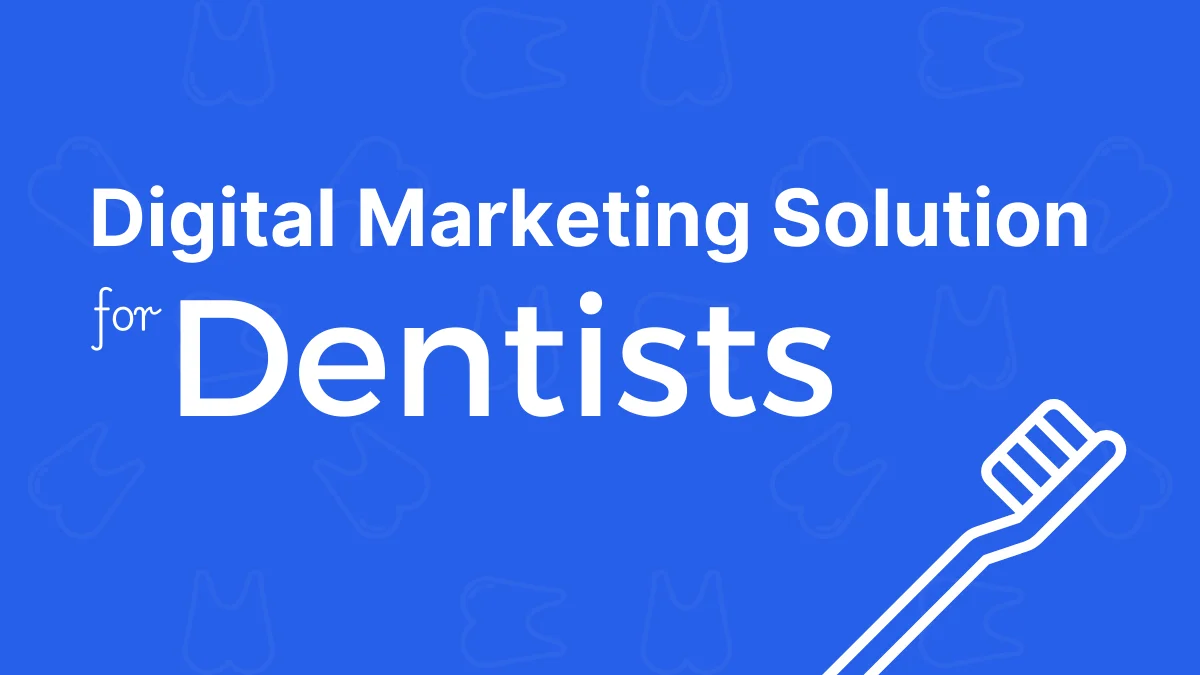
Digital Marketing for Dentists
You know what's funny? Most dentists can perform root canals blindfolded, but ask them about digital marketing and they break out in a cold sweat. If you're a dentist who feels overwhelmed by the online world, you're not alone. The good news? Digital marketing isn't as scary as a wisdom tooth extraction.
This guide will walk you through everything you need to know about digital marketing for your dental practice. By the end, you'll understand how to attract new patients, keep current ones engaged, and grow your practice without breaking the bank or your sanity.
Why Digital Marketing Matters More Than Ever for Dentists

Let's start with a reality check. When was the last time you looked up a business in the Yellow Pages? Exactly. Today, 97% of people search online when looking for local services, including dental care. If your practice isn't visible online, you're essentially invisible to potential patients.
Think of digital marketing as your practice's front door. Before patients ever step into your office, they're already forming opinions about you based on what they find online. Your website, social media presence, and online reviews are working 24/7 to either attract or repel potential patients.
The pandemic accelerated this shift dramatically. Practices that had strong digital presence survived and thrived, while those without struggled. But here's the encouraging part: you don't need to become a tech wizard overnight. You just need to understand the basics and implement them consistently.
Key Digital Marketing Strategies That Actually Work for Dentists

Search Engine Optimization (SEO): Getting Found When It Matters
SEO is like planting seeds in a garden. You won't see results tomorrow, but with consistent care, you'll have a thriving practice that patients can easily find.
What SEO really means for dentists: When someone in your area types "dentist near me" or "teeth cleaning [your city]," you want your practice to show up first. SEO helps make that happen.
Start with these basics:
-
Claim your Google Business Profile and keep it updated with accurate hours, location, and contact information
-
Create location-specific pages on your website (like "Family Dentist in Downtown Portland")
-
Write helpful blog posts answering common patient questions
-
Get listed in local directories like Healthgrades and Yelp
Quick win tip: Add your city name naturally throughout your website. Instead of just "Family Dentistry," use "Family Dentistry in [Your City]."
Social Media: Building Relationships, Not Just Followers
Social media for dentists isn't about going viral with dance videos (unless that's your thing). It's about showing the human side of your practice and building trust with your community.
Facebook remains king for dental practices. Your patients are there, and it's perfect for sharing educational content, practice updates, and patient success stories (with permission, of course).
Instagram works great for visual storytelling. Share before-and-after photos, behind-the-scenes glimpses of your practice, and team spotlights. Just remember to get proper consent for any patient photos.
Content ideas that work:
-
Oral health tips and seasonal reminders
-
Meet-the-team posts
-
Practice milestone celebrations
-
Educational videos about common procedures
-
Community involvement and local partnerships
Email Marketing: The Underrated Powerhouse
Email marketing is like having a direct line to your patients' attention. While social media algorithms come and go, emails land directly in inboxes.
Smart email strategies for dentists:
-
Welcome series for new patients explaining what to expect
-
Appointment reminders and confirmations
-
Seasonal oral health tips
-
Birthday wishes with special offers
-
Post-treatment care instructions and check-ins
Pro tip: Segment your email list. Send different messages to new patients, existing patients, and those due for cleanings. Personalization increases engagement by 29%.
Online Reviews: Your Digital Reputation
Reviews are the modern word-of-mouth marketing. A study found that 90% of patients read online reviews before choosing a healthcare provider, and 84% trust online reviews as much as personal recommendations.
Review management essentials:
-
Monitor reviews across Google, Yelp, Healthgrades, and Facebook
-
Respond to all reviews, positive and negative, professionally
-
Create a system to request reviews from happy patients
-
Address negative feedback promptly and offer to resolve issues offline
The review request process: Wait 24-48 hours after a positive experience, then send a personalized email asking for feedback. Make it easy by including direct links to your review profiles.
Website Optimization: Your 24/7 Marketing Assistant
Your website is often the first impression potential patients have of your practice. It needs to work as hard as you do.
Must-have website elements:
-
Clear contact information and location
-
Easy online appointment booking
-
Before-and-after photo galleries
-
Staff bios and credentials
-
Patient testimonials
-
Mobile-friendly design (60% of searches happen on mobile)
Conversion optimization tip: Include multiple ways for patients to contact you - phone, email, contact forms, and chat if possible. Some people prefer calling, others want to message at midnight.
Practical Tips for Getting Started (Without Losing Your Mind)

Start Small and Build Momentum
You don't need to tackle everything at once. Pick one or two strategies and do them well before adding more.
Month 1: Focus on claiming and optimizing your Google Business Profile and setting up basic social media accounts.
Month 2: Launch a simple email newsletter and create a review request system.
Month 3: Start blogging with one helpful post per month and expand your social media activity.
Use Tools That Make Life Easier
Free tools that save time:
-
Google Business Profile for local SEO
-
Canva for creating social media graphics
-
Mailchimp for email marketing (free up to 2,000 contacts)
-
Google Analytics for website insights
Paid tools worth considering:
-
Hootsuite or Buffer for social media scheduling
-
BirdEye or Podium for review management
-
SimplePractice or Dentrix for integrated patient communication
Create a Content Calendar
Consistency beats perfection every time. Plan your content in advance so you're not scrambling for post ideas at the last minute.
Monthly content planning:
-
Week 1: Educational post about oral health
-
Week 2: Behind-the-scenes content or staff spotlight
-
Week 3: Patient success story or testimonial
-
Week 4: Practice news or community involvement
Budget Realistically
You don't need a Fortune 500 marketing budget. Many dental practices see great results spending $500-2,000 monthly on digital marketing, including tools and advertising.
Budget allocation guide:
-
40% on website and SEO
-
30% on paid advertising (Google Ads, Facebook Ads)
-
20% on tools and software
-
10% on content creation
Common Mistakes That Sabotage Success

Mistake #1: Trying to Do Everything at Once
Many dentists jump into digital marketing like they're performing emergency surgery - with urgency but without a plan. This leads to burnout and inconsistent results.
Solution: Choose 2-3 strategies and execute them consistently for at least 6 months before adding new tactics.
Mistake #2: Forgetting About Compliance
Healthcare marketing has specific rules. You can't just post any patient photo or make certain claims about treatments.
Key compliance reminders:
-
Always get written consent before using patient photos
-
Follow HIPAA guidelines in all communications
-
Don't guarantee treatment outcomes
-
Include necessary disclaimers on your website
Mistake #3: Neglecting Mobile Users
If your website isn't mobile-friendly, you're losing patients. Period. Over 60% of dental searches happen on mobile devices.
Mobile optimization checklist:
-
Fast loading times (under 3 seconds)
-
Easy-to-tap buttons and links
-
Readable text without zooming
-
Simple contact forms
Mistake #4: Inconsistent Messaging
Your brand voice should be consistent across all platforms. If you're professional and clinical on your website but casual and funny on social media, it creates confusion.
Brand consistency tips:
-
Define your practice's personality and stick to it
-
Use the same logo, colors, and fonts everywhere
-
Maintain consistent tone across all content
Mistake #5: Ignoring Analytics
Flying blind is dangerous, whether you're piloting a plane or marketing a practice. If you're not tracking results, you can't improve.
Key metrics to monitor:
-
Website traffic and conversion rates
-
Social media engagement rates
-
Email open and click-through rates
-
Online review ratings and volume
-
New patient inquiries from digital sources
Actionable Next Steps: Your Digital Marketing Game Plan
Ready to transform your dental practice's online presence? Here's your step-by-step action plan:
Week 1: Foundation Setup
-
Claim and optimize your Google Business Profile
-
Audit your current website for mobile-friendliness and contact information accuracy
-
Set up basic social media profiles on Facebook and Instagram
Week 2: Content Creation
-
Write your first blog post answering a common patient question
-
Create a simple email welcome sequence for new patients
-
Take professional photos of your practice and team
Week 3: Review Management
-
Set up monitoring for online reviews across all platforms
-
Create templates for responding to positive and negative reviews
-
Implement a review request process for satisfied patients
Week 4: Analytics and Planning
-
Install Google Analytics on your website
-
Create a content calendar for the next three months
-
Set monthly goals for website traffic, social media engagement, and new patient inquiries
Beyond the First Month
-
Consistently publish helpful content
-
Engage with your community online and offline
-
Monitor your results and adjust strategies based on what works
-
Consider paid advertising once organic efforts are established
Remember, digital marketing for dentists isn't about becoming the next social media influencer. It's about being found by patients who need your help and building trust before they ever sit in your chair. Start small, stay consistent, and watch your practice grow one patient at a time.
The digital world might seem overwhelming, but you've mastered far more complex skills in dental school. With patience and persistence, you'll master this too. Your future patients are searching for you right now - make sure they can find you.
Conclusion
Digital marketing may seem daunting at first, but with the right approach, it's entirely manageable—even for the busiest dental practice.
By focusing on essentials like SEO, social media, email marketing, website optimization, and online reviews, you can steadily grow your patient base and reputation.
Remember to start small, build on each success, and keep your efforts consistent. Mistakes will happen, but learning from them is part of the process.
Your commitment to patient care shines brightest when people can easily find and trust your practice online. Take the first step today, and you’ll soon see just how powerful digital marketing can be for your dental office.
The digital landscape is always changing, but with a bit of patience and persistence, you’ll be well on your way to online success. Your next new patient could be one click away!
30 minutes
Expert Consultation
Terms & Agreements
By booking a free 30-minute consultation, you agree to our terms, including scheduling, cancellation policies, and confidentiality. The session provides expert advice without guarantees of specific outcomes or results.





Leave a Reply
Your email address will not be published. Required fields are marked *